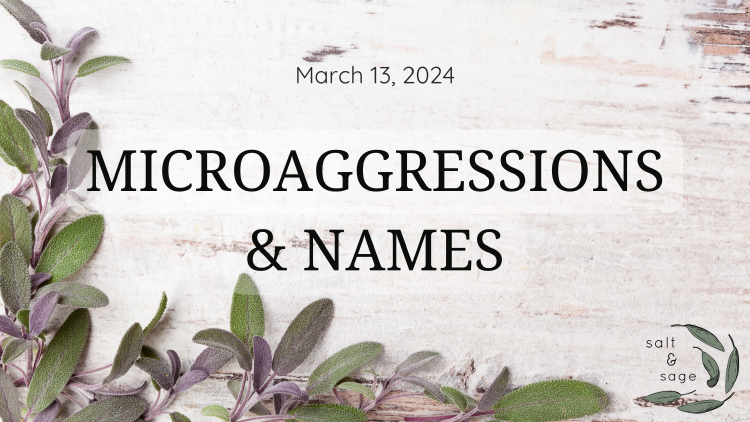Is your name easy to spell? Easy to pronounce? Here’s how to tell: go to a coffee shop. Tell them your name, and watch for that tiny flicker in the barista’s eye.
Erin’s writing this one, and guess what? The worst I’ve ever gotten was Aaron. (I was deeply offended by the misgendering, at my tender age of 13.) But it was still pronounced correctly. I still knew it was my drink.
I’ve been to coffee shops all over the world with friends from all over the world. I’m privileged enough that I sometimes forget about the coffee shop name worry until I’m in the middle of it, but it usually goes something like this.
Friend: I’d like a vanilla latte with oat milk, please.
Barista: Ok! Can I get a name for that order?
Friend: …
One of two things happens at this moment. The friend either decides that they’re going to risk it–or they give a fake name. They’re suddenly Ashley or Becky or Monica or Jen. My heart breaks a little bit every time that happens, because I know how the other option plays out. The barista tries–fails–tries again–asks how to spell it–then, feeling the full weight of their difficulty, says something. Sometimes it’s nice–”that’s a beautiful name, I’ve never heard it before, sorry I had to ask you to spell it more than once!” But sometimes it’s mean. “What? What did you say? That’s not a name. I’ve never heard of it. I don’t know how to spell THAT. What a weird name.”
Those conversations are usually hushed, bent over the cash register. When I ask why my friend is sighing, she says, “Just another person who doesn’t believe my name is real.”
Microaggressions
If you’ve never heard of a microaggression, let’s define. Aggression is clear enough; we’ve all been in enough traffic to understand what that is. But the micro throws people off. Usually, aggression is loud, big, obvious. Despite the microaggression’s size–sometimes as tiny as a sigh or an eye-roll–its impact is no less important.
You may not have any idea what it’s like to have your name mispronounced, but surely you have experienced the nonstop sting of someone devaluing something important to you. Scale it up. Imagine.
I’ll be really clear here: microaggressions are socially acceptable racism.
Intent Matters, But Not Over Impact
For the most part, I believe that humans mean well. I think we don’t want to hurt others, we want to be kind, and we want to belong. I think we are all doing what we can with the knowledge that we have. And now you know better, so we hope you’ll do better.
Whether it’s ignorance about a name, worry about how to not sound silly as you pronounce it, or the combo one-two punch of wanting to be welcoming but knowing you’re going to mess up, there are lots of ways for us to unintentionally perpetuate the sense that the only “right” and “real” name is a white name: one we can recognize, easily pronounce, easily spell.
But that puts YOUR comfort at the center of this equation, instead of correctly centering the person you’re talking to. Your personal comfort is not more important than the personhood of someone else.
Sachiko calls this “the social cost [of] having an ethnic name.” You can hear more of her story on our podcast.
So, the next time you encounter a name that seems unfamiliar, take a moment to pause and ask for clarification. It’s not just about getting it right; it’s about validating someone’s identity and honoring their heritage.
And listen–if you can learn how to pronounce Tchaikovsky, you can learn to say other names, too.
To hear a more in-depth conversation about this, listen to our podcast episode.
















